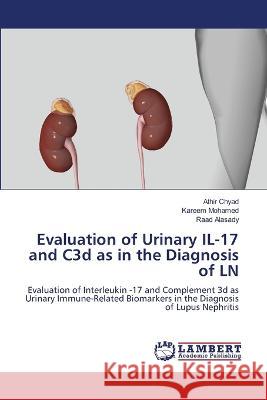Evaluation of Urinary IL-17 and C3d as in the Diagnosis of LN » książka
Evaluation of Urinary IL-17 and C3d as in the Diagnosis of LN
ISBN-13: 9786206150305 / Angielski / Miękka / 148 str.
The kidney involvement is a key problem (50%) in SLE, and responsible for a high morbidity and mortality. Early detection and treatment can significantly alter the course of LN and enhance long-term survival.Urinary (u)biomarkers are new markers that can distinguish LN activity, severity, predict renal flares, and monitor therapy response and progression. Because they are derived from urinary tissues, they can reflect the current disease situation.This study aimed to evaluate the diagnostic value of IL-17 and C3d as urinary biomarkers for LN diagnosis. An ELISA was used to detected uIL 17 and C3d.uC3d and IL-17 levels were statistically higher in LN group than those without LN. Levels of uC3d positively correlated with rSLEDAI, while uIL-17 was not significantly associated with it. The best cut-off values of uC3d and IL-17 to differentiate LN patients from non-LN patients were 1.19 ug/mg cr and 0.051 ng/mg cr, with 84% and 60% sensitivity, 57% and 92% specificity, AUC = 0.809 and 0.820 respectively. This study concluded that uC3d and IL-17 had a high accuracy, and can be considered as good predictors for diagnosis of active LN, and C3d can be used to evaluate LN activity.











